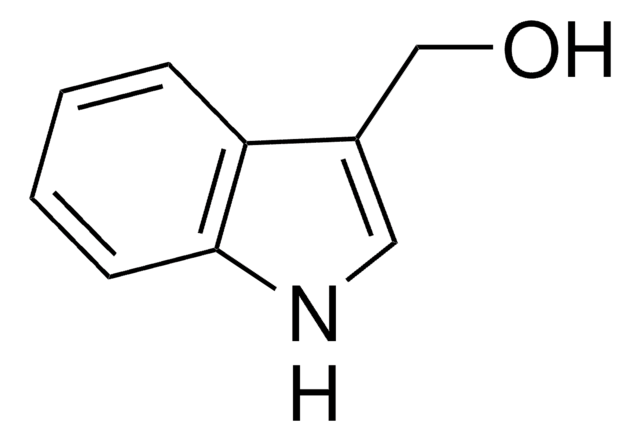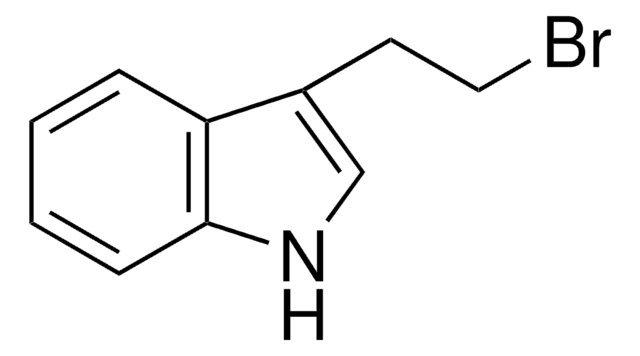286281
Indole-3-acetamide
98%
Synonym(s):
3-Indolylacetamide, NSC 1969
Sign Into View Organizational & Contract Pricing
All Photos(1)
About This Item
Empirical Formula (Hill Notation):
C10H10N2O
CAS Number:
Molecular Weight:
174.20
EC Number:
MDL number:
UNSPSC Code:
12352100
PubChem Substance ID:
NACRES:
NA.22
Recommended Products
Assay
98%
mp
148-150 °C (lit.)
SMILES string
NC(=O)Cc1c[nH]c2ccccc12
InChI
1S/C10H10N2O/c11-10(13)5-7-6-12-9-4-2-1-3-8(7)9/h1-4,6,12H,5H2,(H2,11,13)
InChI key
ZOAMBXDOGPRZLP-UHFFFAOYSA-N
General description
Indole-3-acetamide is an auxin precursor.
Application
Indole-3-acetamide was used in the synthesis of [5.5.6.6]diazafenestrane skeleton and indole-3-acetic acid.
Reactant for the synthesis of:
- PET agent for imaging of protein kinase C
- A potential agent against Prion Disease
- Protein kinase C (PKC) inhibitor bisindolylmaleimide IV
- Glycogen synthase kinase-3ß (GSK-3ß) inhibitors
- Inhibitors of CaMKIId
- A VEGF inhibitor
- JAK3 inhibitors
- Inhibitors of NAD+-Dependent Histone Deacetylases
- Inhibitors of human adipocyte fatty acid-binding protein
- Cyclin-dependent kinase inhibitors
Storage Class Code
11 - Combustible Solids
WGK
WGK 3
Flash Point(F)
Not applicable
Flash Point(C)
Not applicable
Personal Protective Equipment
dust mask type N95 (US), Eyeshields, Gloves
Certificates of Analysis (COA)
Search for Certificates of Analysis (COA) by entering the products Lot/Batch Number. Lot and Batch Numbers can be found on a product’s label following the words ‘Lot’ or ‘Batch’.
Already Own This Product?
Find documentation for the products that you have recently purchased in the Document Library.
Customers Also Viewed
Christian O Dimkpa et al.
Applied and environmental microbiology, 78(5), 1404-1410 (2012-01-03)
The beneficial bacterium Pseudomonas chlororaphis O6 produces indole-3-acetic acid (IAA), a plant growth regulator. However, the pathway involved in IAA production in this bacterium has not been reported. In this paper we describe the involvement of the indole-3-acetamide (IAM) pathway
Stephan Pollmann et al.
Phytochemistry, 62(3), 293-300 (2003-03-07)
Acylamidohydrolases from higher plants have not been characterized or cloned so far. AtAMI1 is the first member of this enzyme family from a higher plant and was identified in the genome of Arabidopsis thaliana based on sequence homology with the
Rudy Maor et al.
Applied and environmental microbiology, 70(3), 1852-1854 (2004-03-10)
The plant pathogenic fungus Colletotrichum gloeosporioides f. sp. aeschynomene utilizes external tryptophan to produce indole-3-acetic acid (IAA) through the intermediate indole-3-acetamide (IAM). We studied the effects of tryptophan, IAA, and IAM on IAA biosynthesis in fungal axenic cultures and on
Daiana Duca et al.
Antonie van Leeuwenhoek, 106(1), 85-125 (2014-01-22)
Indole-3-acetic acid (IAA) is an important phytohormone with the capacity to control plant development in both beneficial and deleterious ways. The ability to synthesize IAA is an attribute that many bacteria including both plant growth-promoters and phytopathogens possess. There are
S Taliani et al.
Current medicinal chemistry, 16(26), 3359-3380 (2009-06-25)
The Translocator protein (TSPO), formerly known as the peripheral-type benzodiazepine receptor, is an 18 kDa mitochondrial protein primarily involved in steroid biosynthesis in both peripheral and glial cells. It has been extensively reported that TSPO regulates the rate-limiting translocation of
Our team of scientists has experience in all areas of research including Life Science, Material Science, Chemical Synthesis, Chromatography, Analytical and many others.
Contact Technical Service











